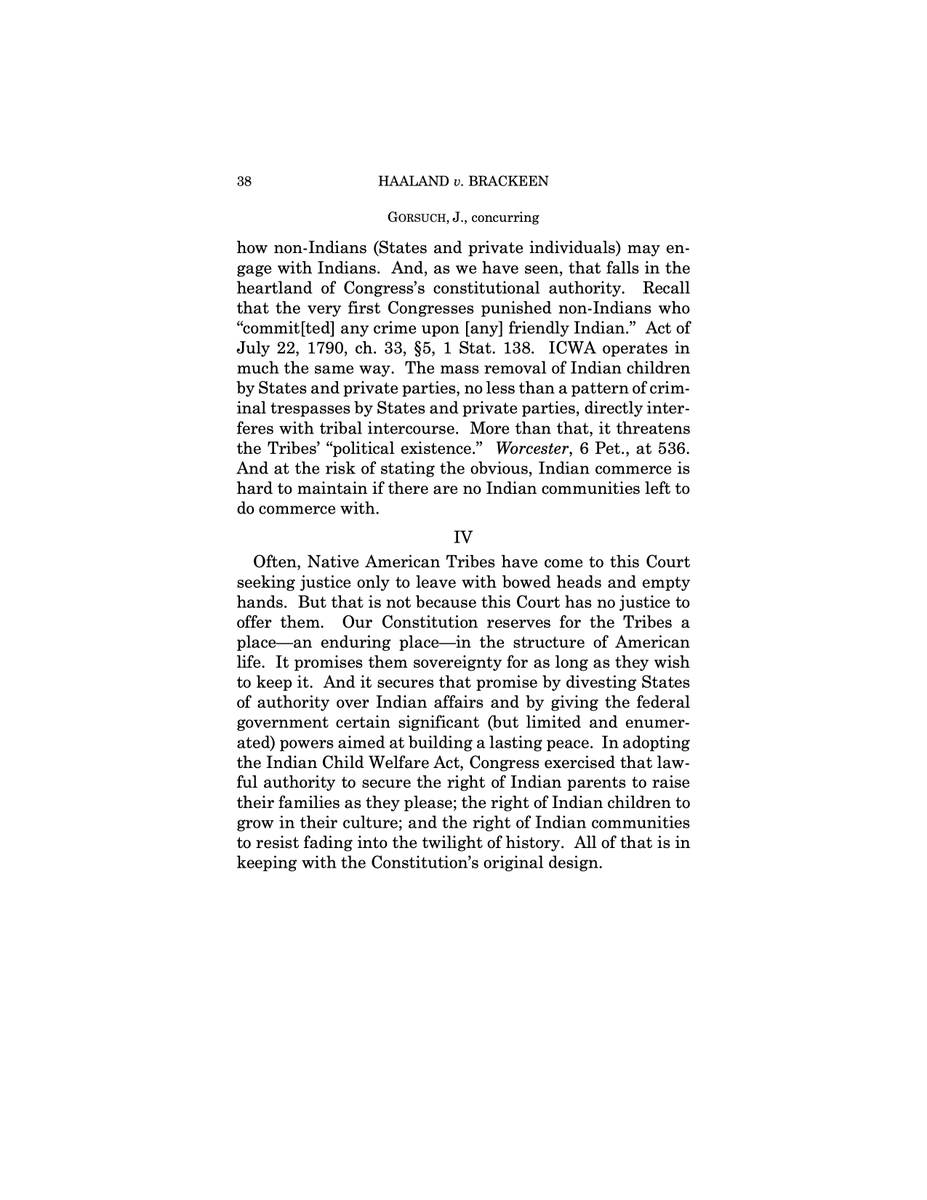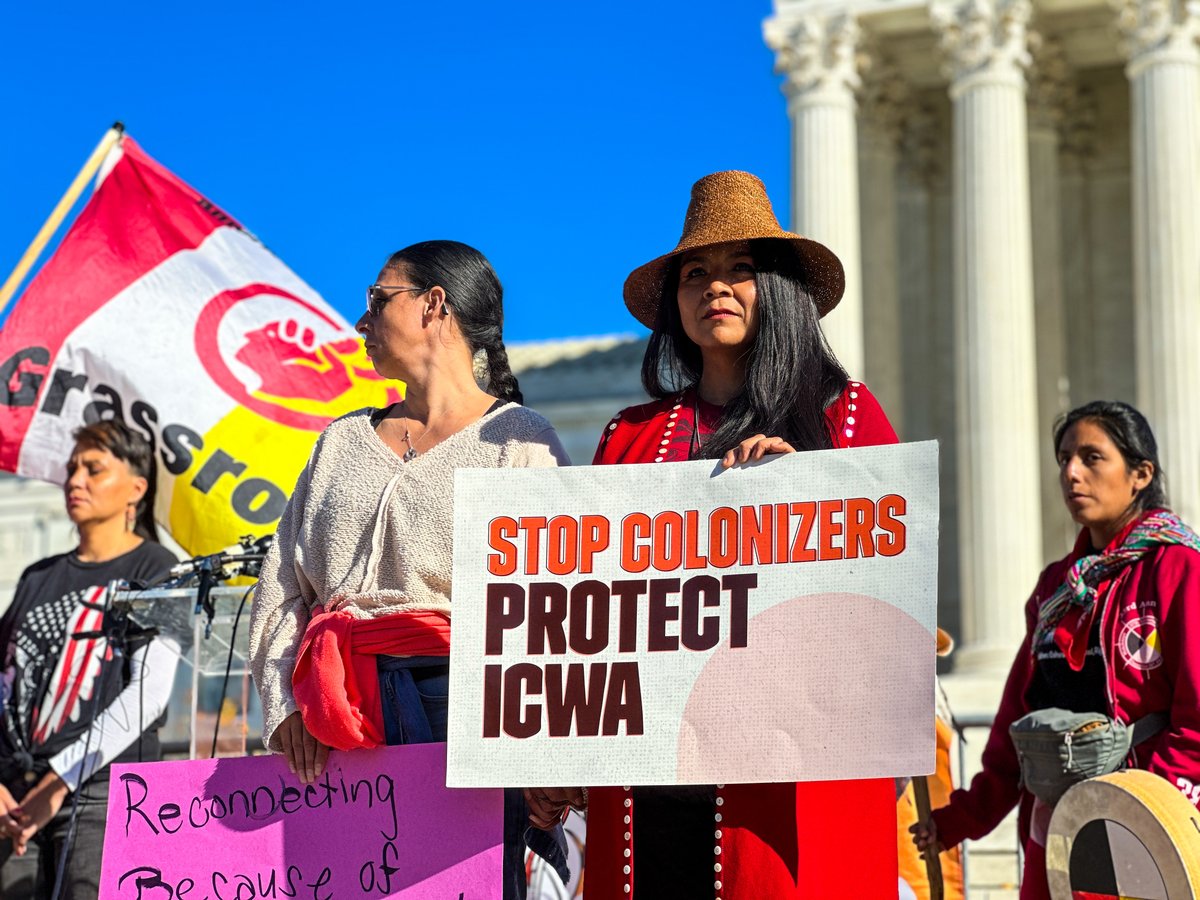The U.S. Supreme Court also has issued the long-awaited decision in Haaland v. Brackeen. #ICWA #DefendICWA #ProtectICWA
supremecourt.gov/opinions/22pdf…
supremecourt.gov/opinions/22pdf…
The Haaland v. Brackeen has been one of the most closely watched Indian law cases in recent history. At stake is the Indian Child Welfare Act, the gold standard in child welfare law and the law that recognizes that tribes have a say in the futures of their children. #ICWA
The decision in Haaland v. Brackeen is noticeably complex. The entire document, including the syllabus, opinion, concurring opinions and dissent totals 133 pages. #ICWA #DefendICWA #ProtectICWA
But a quick reading shows that a majority of the justices of the U.S. Supreme Court are in SUPPORT of the Indian Child Welfare Act.
More reading of this historic decision in Haaland v. Brackeen to come. #ICWA #DefendICWA #ProtectICWA
More reading of this historic decision in Haaland v. Brackeen to come. #ICWA #DefendICWA #ProtectICWA
Based on the quick reading of the U.S. Supreme Court decision in Haaland v. Brackeen, the vote in support of the Indian Child Welfare Act appears to be 7-2.
Justice Amy Coney Barrett authors the court's opinion in the historic case.
#Brackeen #ICWA #DefendICWA #ProtectICWA
Justice Amy Coney Barrett authors the court's opinion in the historic case.
#Brackeen #ICWA #DefendICWA #ProtectICWA
In majority opinion, Justice Amy Coney Barrett writes in support of the tribal position when it comes to legality of Indian Child Welfare Act: "In sum, Congress’s power to legislate with respect to Indians is well established and broad." #Brackeen #ICWA #DefendICWA #ProtectICWA
Justice Barrett continues in support of #ICWA: "Consistent with that breadth, we have not doubted Congress’s ability to legislate across a wide range of areas, including criminal law, domestic violence, employment, property, tax, and trade." #Brackeen #DefendICWA #ProtectICWA
Justice Neil Gorsuch in concurring #ICWA opinion: "The Indian Child Welfare Act did not emerge from a vacuum. It came as a direct response to the mass removal of Indian children from their families during the 1950s, 1960s, & 1970s by state officials & private parties." #Brackeen
Justice Gorsuch explains while Indian Child Welfare Act exists: "In all its many forms, the dissolution of the Indian family has had devastating effects on children and parents alike." #Brackeen #DefendICWA #ProtectICWA #ICWA
Justice Gorsuch in support of tribes in Indian Child Welfare Act case: "It has also presented an existential threat to the continued vitality of Tribes—something many federal and state officials over the years saw as a feature, not as a flaw." #Brackeen #DefendICWA #ProtectICWA
In explaining need for Indian Child Welfare Act, Justice Gorsuch cites ongoing investigation @Interior of Indian boarding schools: "So as they ceded their lands, Tribes also negotiated 'more than 150' treaties with the United States that included 'education-related provisions.'"
Justice Gorsuch adds this nugget in explaining the sovereignty of Indian nations--as understood for CENTURIES: "We now know that, at the founding, the Tribes retained their sovereignty. We know also that States have virtually no role to play in managing interactions with Tribes."
Justice Gorsuch on Indian Country-isms:"This observation sheds light on why ordinary speakers use the two terms differently. It explains, for instance, why it is grammatical to say you are vacationing 'in Colorado,' but not to say you are vacationing 'in Navajo.'" #ICWA #Brackeen
More from Justice Gorsuch on historic decision in Indian Child Welfare Act case: "Today, the Court takes further steps in the right direction. It recognizes that Congress’s powers with respect to the Tribes 'derive from the Constitution, not the atmosphere.'" #ICWA #Brackeen
Justice Gorsuch continues: "By now, the full picture has come into view and it is easy to see why ICWA must stand. Under our Constitution, Tribes remain independent sovereigns responsible for governing their own affairs." #ICWA #Brackeen #DefendICWA #ProtectICWA
For more emphasis, Justice Gorsuch adds: "And as this Court has long recognized, domestic law arrangements fall within Tribes’ traditional powers of self-governance." #ICWA #Brackeen #DefendICWA #ProtectICWA
On final page of concurring #ICWA opinion, Justice Gorsuch understands the assignment:"Often, Native American Tribes have come to this Court seeking justice only to leave with bowed heads and empty hands. But that is not because this Court has no justice to offer them." #Brackeen
Justice Gorsuch: "Our Constitution reserves for the Tribes a place—an enduring place—in the structure of American life. It promises them sovereignty for as long as they wish to keep it." #ICWA #Brackeen #DefendICWA #ProtectICWA
The final page -- more importantly the final paragraph -- of Justice Neil Gorsuch's concurring opinion in Indian Child Welfare Act case demands its own post. #ICWA #Brackeen #DefendICWA #ProtectICWA 

Now onto the less good parts.
Justice Brett Kavanaugh -- conservative member of U.S. Supreme Court -- joins majority opinion in Indian Child Welfare Act case in "full."
But in concurrence, he wanted to decide whether a "child’s race" is an issue in child welfare proceedings.
Justice Brett Kavanaugh -- conservative member of U.S. Supreme Court -- joins majority opinion in Indian Child Welfare Act case in "full."
But in concurrence, he wanted to decide whether a "child’s race" is an issue in child welfare proceedings.
And in what comes as no surprise, Justice Clarence Thomas and Justice Samuel Alito both wrote dissents in historic Indian Child Welfare Act case.
These conservative members of the U.S. Supreme Court want to see #ICWA gone from the books. #Brackeen #DefendICWA #ProtectICWA
These conservative members of the U.S. Supreme Court want to see #ICWA gone from the books. #Brackeen #DefendICWA #ProtectICWA
In 40-PAGE dissent, Justice Thomas objects to "regulating state-court child custody proceedings of U.S. citizens, who may never have even set foot on Indian lands, merely because the child involved happens to be an Indian." #ICWA #Brackeen #DefendICWA #ProtectICWA
Justice Thomas also complains that Indians aren't Indian enough: "Today, Indians are citizens of the United States; the vast majority of them do not live on any reservation or Indian lands, but live (as most citizens) on lands that are wholly within a State’s jurisdiction." #ICWA
If you can't see tell Justice Thomas really thinks about Indian Nations, a footnote: "An analogous law might be if the Federal Government tried to regulate the child custody proceedings of U.S. citizens who are eligible for Russian, Mexican, Israeli, or Irish citizenship." #ICWA
Justice Alito's dissent only runs 11 pages. He describes non-Indian opponents of the Indian Child Welfare Act in glowing terms, saying they acted "lovingly" and merely wanted to provide a "stable home" for some young tribal citizens. #Brackeen #DefendICWA #ProtectICWA #ICWA
Justice Alito tries to be nice in dissent in historic Indian Child Welfare Act case: "I am sympathetic to the challenges that tribes face in maintaining membership and preserving their cultures." #Brackeen #DefendICWA #ProtectICWA #ICWA
But, according to Justice Alito: "the Constitution does not permit Congress to displace long-exercised state authority over child custody proceedings to advance those interests at the expense of vulnerable children and their families." #Brackeen #DefendICWA #ProtectICWA #ICWA
• • •
Missing some Tweet in this thread? You can try to
force a refresh

 Read on Twitter
Read on Twitter





